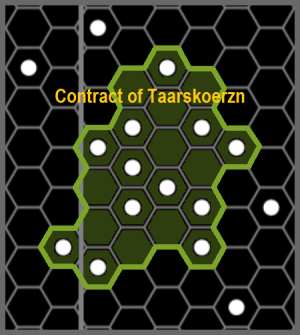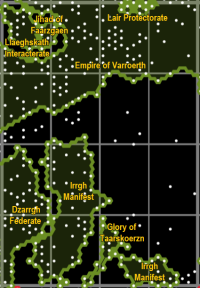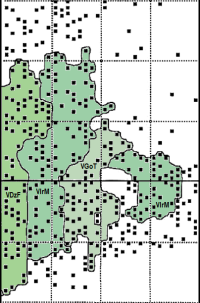Glory of Taarskoerzn
The Glory of Taarskoerzn is a Vargr polity located in Provence Sector as part of the Vargr Extents.
Allegiance Codes[edit]
| Polity | Survey | Code | Type | Remarks |
|---|---|---|---|---|
| Vargr Extents | Pre-Imperial | None | No standard code | None |
| Vargr Extents | 1st Survey (300) | None | 2-ltr code | Founded in 869. |
| Glory of Taarskoerzn | 2nd Survey (1065) | VGoT | 4-ltr code | None |
Description (Specifications)[edit]
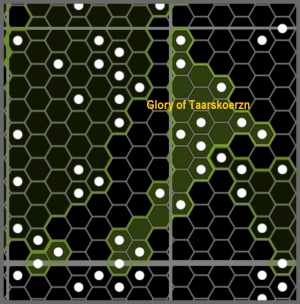
The Glory of Taarskoerzn is centered on a small cluster of thirteen Vargr-dominated worlds lying close to the Windhorn Rift, in the rimward part of Provence Sector. It was formed in 869 when it seceded from the Irrgh Manifest during a time of unrest. It fought a war against the Manifest to keep its independence in the early 870s, with the territory it held when an armistice was agreed forming its current borders.
In its fight for independence the Glory acquired a number of neutral and Manifest worlds lying along the rimward border of the sector. The terms of the armistice allowed it to retain these territories, but at the cost of the Manifest retaining three of its home systems.
History & Background (Dossier)[edit]
The Glory of Taarskoerzn was founded in 869 by a number of worlds that broke away from the powerful Irrgh Manifest.
- The Manifest was experiencing a time of unrest and was unable to counter the Glory's independence.
The Contract of Taarsloerzn[edit]
The Glory's core worlds had been members of the Contract of Taarskoerzn, a Vargr polity with strong religious views that existed between the 100s and the early 400s. The Contract had been absorbed by the Irrgh Manifest as that state grew, but its former worlds shared a strong cultural identity and heritage and often found themselves at odds with the the Manifest's policies and goals.
Formation[edit]
The Irrgh Manifest was shaken by political scandal and internal turmoil in the mid and late 800s, with unrest and even rebellion on worlds across the polity. A new, highly militant government seized power on Taarskoerzn. The new leadership was heavily influenced by the Church of the Chosen Ones, finding justification for independence in the Church's teachings and support among many of the other former member worlds of the old Contract of Taarskoerzn. The Declaration of Independence occurred in 869.
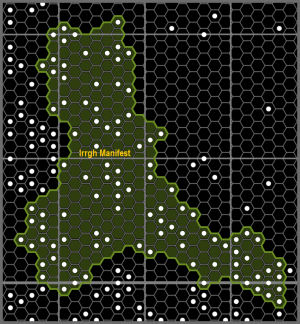
The Taarskoerzn military recognized its weakness: it was a small force in the midst of a comparative giant. The breakaway worlds were relatively wealthy, and mercenary and corsair forces were hired in huge numbers. Tithes and contributions to the Church swelled its coffers and funded its huge mercenary army, while citizen-militias with religious leaders sprang up.
A number of pre-emptive strikes, deep raids, and pitched battles were fought against Irrgh Manifest forces during the early 870s. The Manifest, heavily involved in suppressing the unrest occurring within its territory, was unable to bring its full military might to bear against rebellious Taarskoerzn state, but it did manage to retake a number of the Glory's spinward worlds. The Glory for its part struck out to rimward, capturing neutral and Manifest worlds along the edge of Voudzeur Subsector.
The fighting was intense and costly and the defenders were fanatical, driven by their faith in Taarskoe and the teachings of the Church, their divine destiny, and the promise of an afterlife-paradise. Years of conflict left both sides exhausted and a temporary truce was agreed, freezing the borders as they stood at that moment, despite the fact that this effective secession cut the Irrgh Manifest into two separate pieces. The Glory used the ongoing truce to rebuild and reinforce its defences, while the Manifest consolidated its remaining territories, stamped out the last embers of insurrection, and marshalled its forces around the Taarskoerzn region.
Continuation[edit]
Despite occasional border incidents the armistice held, much to the surprise of almost all outside observers.
Neither side was ready to renew the conflict without extensive preparations, and behind the scenes agreements and understandings were being made. A security treaty established communication corridors allowing the two halves of the Manifest to communicate with one another, and interstellar trade across Glory territory was re-established, bringing huge amounts of additional revenue to the Glory. Both sides remain openly hostile towards one another:
- the Manifest has made no secret of the fact that it intends to retake its one remaining "rebel province" and rejoin its divided territories.
- The leadership of the Glory intends to reclaim its lost worlds and deliver Holy Vengeance upon the heretical Manifest, when "the right time is right".
To date, the Irrgh Manifest and the Glory have eyed each other suspiciously – but mostly peacefully – for over 130 years.
Government & Politics[edit]
The Glory of Taarskoerzn is an interstellar, multi-system Hegemony, characterized by a very high degree of centralization, strong policies that direct the entire sectors or states, and a strong disregard for local/planetary differences.
- It is broadly classified by the Imperium as a Religious Dictatorship, with its leadership heavily influenced by the Church of the Chosen Ones.
- It is supported by an extensive Impersonal Bureaucracy.
Faith and Belief[edit]
The Contract of Taarskoerzn, the old Vargr state that the Glory modeled itself on, worshipped an ancient Vargr deity of war named Taarskoe. The god was worshipped on Lair prior to the discovery of jump technology.
- Taarskoism was the state religion of the Contract. Taarskoe-worship continues within the Glory to the present day.
Most Vargr consider Taarskoe a fictional figure or a purely spiritual entity. However, within the rimward regions of the Vargr Extents, the Church of the Chosen Ones regards Taarskoe as a real historical figure and prophet who ascended to a divine role upon his death.
- This has won many followers of Taarskoism over to the Church of the Chosen Ones.
Military Forces[edit]
The Glory has a small, well-equipped navy that acts both as a defensive force and as a police agency, and an elite marine force. It fields a huge and fanatical Citizen Militia, effectively large, heavily armed mobs led by inspirational religious leaders.
Worlds & Sectors (Astrography)[edit]
This polity can be primarily found in the following areas:
Charted Space – Vargr Extents:
Capital:[edit]
The capital of this polity is located at:
World Listings[edit]
Comprehensive Second Survey UWP data for all worlds lying within the polity is available.
- The primary source material for all data is Traveller Map.
- Other sources may contain contradictory or incorrect information.
| startbacknext(17 listed) |
Note that some Second Survey data, though only 40 years old, is likely to be out of date.
- Data is occasionally updated as new information becomes available.
- Scouting missions gathering reliable, verified data can receive substantial payment.
- Verified updated data is constantly sought.
Major Historical Events Timeline[edit]
Major events that have affected this sector and the wider region that it lies within:
- ca -250,000: The Ancients were active within the sector, transplanting the Vargr onto Lair.
- -9235: the Vilani discover jump technology. A few explorers and settlers begin to pioneer the region.
- -3810: the Vargr discover jump technology and begin an era of expansion.
- -2400s: Vargr raiding into human-dominated areas significantly increases. This becomes known as the Vargr Pillaging.
- ca -1700: Vargr rimward expansion gradually ceases: the border between human and Vargr space stabilizes.
- -1776 to 0: the Long Night. There is widespread regression within the area and some worlds become barren.
- The Year 0: to rimward-trailing, the Third Imperium is founded.
- circa 26: the Empire of Varroerth is founded.
- early 100s: the Contract of Taarskoerzn is founded.
- 300-420: the Imperial First Survey charts the sector.
- early 400s: the Irrgh Manifest is founded: it absorbs the Contract of Taarskoerzn.
- 869: the Glory of Taarskoerzn is founded. It splits the Irrgh Manifest.
- 995-1065: the Imperial Second Survey charts the polity.
- 1065: the Second Survey is published. Information about the polity becomes widely available.
Later Eras[edit]
Rebellion and The Collapse[edit]
The time for retribution against its enemies eventually did come, in 1116, with Strephon's assassination and the subsequent fragmentation of the Imperium. With Taarskoerzn naval forces augmented by corsair mercenaries, Taarskoerzn fleets coerced and battled their way into Manifest territory and rimward into Imperial space in Corridor Sector. The anti-Imperial Oekhsos Tirades only bolstered public sentiment, and the Taarskoerzn government felt that it was finally time to set out on a course of galactic conquest.
The Taarskoerzn fighters were initially successful. Raiders looted a number of both Irrgh and Imperial worlds. One large force laid siege to Lemish (Corridor 1808), a subsector capital, and tried to take the world's resources by duress. Unfortunately, the populace refused the Taarskoerzn demands. In retribution, Lemish's starport was all but destroyed, along with key industrial centers. With wealth pouring in from the Imperium, and the hostile Irrgh Manifest seemingly unable to rejoin its divided territory, conditions looked favorable tor Taarskoerzn expansion.
A freak occurrence disrupted Taarskoerzn plans, however. The Vaenggvae, a corsair group hired as naval auxiliaries, managed to accomplish a feat at which all others had failed: the coercion of the Corridor Depot's personnel. Backed by the Depot's incredible resources, the Vaenggvae quickly rose to dominate all other Vargr forces in the region. This corsair group, once a minor band operating out of the Glory of Taarskoerzn, now dictated policy to the government of its former territory.
Era Summary[edit]
A small but fanatical government in Provence Sector, the Glory has proven nothing but rapacious in its attacks on Corridor. The Taarskoerzn navy, bolstered by corsair mercenaries, coerced and fought its way through Irrgh territory and into human space. Since then, the Taarskoerzn forces have met with great success, both in looting Imperial and Irrgh worlds. Perhaps the most heinous act of the Glory was the lead it took in sacking Lemish – an attack that took the lives of millions of people.
References[edit]
- James Holden, Joe D. Fugate Sr., Terrance McInnes. Vilani & Vargr (Digest Group Publications, 1990), pages 11, 48, 49. (Dot maps giving the locations of the polity's worlds, and charts showing political allegiances)
- Rob Caswell. "Life Under the Vargr: Snapshots of the Occupation." MegaTraveller Journal 2 (1991): page 47,52.

